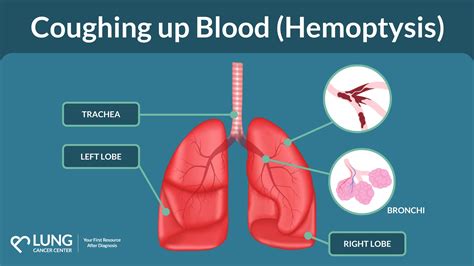Intro
Coughing up blood? Learn about cough and hemoptysis causes, symptoms, and treatments, including bronchitis, pneumonia, and lung cancer, to understand bloody coughs and when to seek medical help.
Coughing is a common symptom that can be caused by a variety of factors, ranging from minor irritations to life-threatening conditions. When coughing is accompanied by coughing up blood, it can be a sign of a more serious underlying issue. Coughing up blood, also known as hemoptysis, can be a frightening experience, and it's essential to understand the possible causes and seek medical attention if it persists or worsens over time.
Coughing is a natural reflex that helps clear the airways of irritants, such as dust, smoke, or mucus. However, when coughing becomes persistent or is accompanied by other symptoms like chest pain, difficulty breathing, or coughing up blood, it may indicate an underlying condition that requires medical attention. Coughing up blood can be caused by a range of factors, including respiratory infections, lung diseases, or cardiovascular conditions. In some cases, it may be a sign of a life-threatening condition, such as lung cancer or pulmonary embolism.
The importance of seeking medical attention when experiencing coughing up blood cannot be overstated. While it may be tempting to dismiss it as a minor issue, coughing up blood can be a sign of a serious underlying condition that requires prompt medical attention. A healthcare professional can help diagnose the underlying cause of coughing up blood and provide appropriate treatment to prevent further complications. In this article, we will delve into the possible causes of coughing up blood, the symptoms to look out for, and the treatment options available.
Causes Of Coughing Up Blood

Respiratory Infections
Respiratory infections, such as pneumonia or bronchitis, are common causes of coughing up blood. These infections can cause inflammation and irritation in the airways, leading to coughing and bleeding. In some cases, the infection can spread to the lungs, causing more severe symptoms, including coughing up blood.Lung Diseases
Lung diseases, such as COPD or cystic fibrosis, can also cause coughing up blood. These conditions can cause chronic inflammation and damage to the lungs, leading to coughing and bleeding. In some cases, the disease can cause the airways to become narrowed or blocked, leading to increased pressure and bleeding.Symptoms Of Coughing Up Blood

Coughing Up Blood Symptoms
Coughing up blood can be a frightening experience, and it's essential to seek medical attention if you experience any of the following symptoms: * Coughing up large amounts of blood or bleeding that lasts for more than a few days * Coughing up blood that is accompanied by chest pain or difficulty breathing * Coughing up blood that is accompanied by fever or chills * Coughing up blood that is accompanied by weight loss or loss of appetiteTreatment Options For Coughing Up Blood

Treatment For Respiratory Infections
Treatment for respiratory infections, such as pneumonia or bronchitis, typically involves antibiotics to kill the underlying bacteria. In some cases, hospitalization may be necessary to provide oxygen therapy and monitor the patient's condition.Treatment For Lung Diseases
Treatment for lung diseases, such as COPD or cystic fibrosis, typically involves a combination of medications, including bronchodilators and corticosteroids. In some cases, oxygen therapy may be necessary to increase oxygen levels in the blood.Prevention Of Coughing Up Blood

Prevention Of Respiratory Infections
Preventing respiratory infections, such as pneumonia or bronchitis, requires a combination of lifestyle changes and medical interventions. Some possible ways to prevent respiratory infections include: * Getting vaccinated against flu and pneumonia * Practicing good hygiene, such as washing hands regularly * Avoiding close contact with people who are sick * Staying home from work or school if you are sickConclusion And Next Steps

What are the possible causes of coughing up blood?
+Coughing up blood can be caused by a range of factors, including respiratory infections, lung diseases, or cardiovascular conditions.
What are the symptoms of coughing up blood?
+The symptoms of coughing up blood can vary depending on the underlying cause, but common symptoms include coughing up blood or rust-colored mucus, chest pain or discomfort, and difficulty breathing.
How is coughing up blood treated?
+The treatment options for coughing up blood depend on the underlying cause, but possible treatments include antibiotics, bronchodilators, anticoagulants, surgery, radiation therapy, and oxygen therapy.
We hope this article has provided you with a comprehensive understanding of coughing up blood, its possible causes, symptoms, and treatment options. If you have any further questions or concerns, please don't hesitate to reach out to a healthcare professional. Additionally, we encourage you to share this article with others who may be experiencing similar symptoms, and to take the first step towards managing your condition and preventing further complications.
